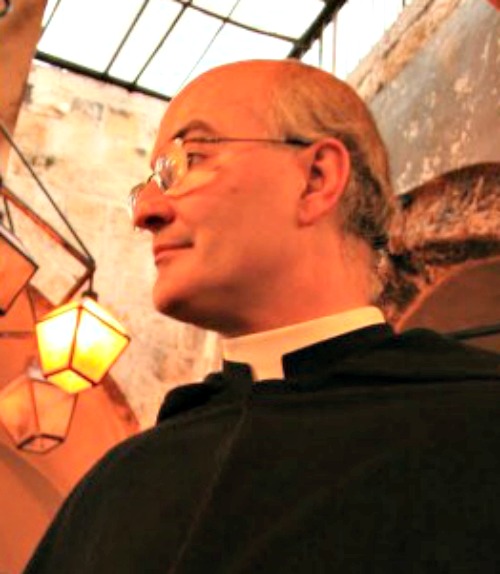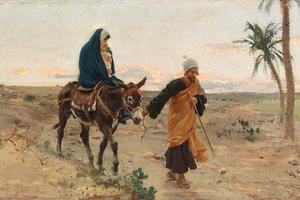Halloween, the Catholic Faith and the Occult
An Interview With Father Jose Antonio Fortea

Dealing with the demonic was not Father Jose Antonio Fortea’s first choice for his priestly ministry. Yet, for more than 15 years, he has been a world-renowned exorcist.
In 1998, the Spanish priest completed his licentiate thesis, “Exorcism in the Present Age,” and in 2006, he published Interview With an Exorcist. Father Fortea has a degree in theology from the University of Navarra, a licentiate degree in Church history from the Pontifical University of Comillas in Madrid and is completing a doctorate in theology in Rome.
Father Fortea is a priest of the Diocese of Alcalá de Henares. He spoke to Dan Burke, the Register’s executive director, this week on Register Radio from Spain about Halloween, esoteric practices and the occult, his work as an exorcist and the reality of possession. This interview was adapted, with Father Fortea’s permission, from the radio interview.
Around the time of Halloween, there’s always a renewed interest in the demonic, other-worldly beings and ghosts. Few understand that, outside of the lighthearted activities of Halloween, there’s a dark reality that the Church has always been engaged with. You’ve had interest in this realm since the penning of your licentiate thesis, “Exorcism in the Present Age.” Why has this topic drawn your interest for so long, and where did your interest begin?
I was the pastor of a little village of a province in Spain. Suddenly, I received a phone call from my bishop. He said, “I want you to do your thesis about this topic.” And I said, “No, you’re crazy, because I am specializing in the history of the Church. What you’re proposing is another specialty.”
But he insisted. And I insisted that I wasn’t very prepared to begin that research, and in fact, I said to him very clearly, “I have no interest in doing this thesis.” But, finally, he gave the order, and I had to obey.
Then I began, for two years, the research. When I finished my thesis, I thought everything was finished, and I could return to my village and what I thought was my vocation and writing books — but not about this topic.
Then a case appeared a month or so after I defended my thesis. I thought, “It’s a false alarm,” but it was a true case. In the next month, a second case appeared. And then another case and another case. In the beginning, I thought, “Perhaps I am attending all the cases that have been accumulating for decades,” but years passed, and the number of people knocking on the doors of my parish was increasing. I had to sit down and think, “Do I want to continue with this work?”
After thinking about that, I thought, “Well, I have experience, so I’ll continue as a service for the people.”
With respect to what some would call a harmless cultural celebration of Halloween, is there any real danger for Catholics who participate in these kinds of activities? Is there anything Satanic going on during this period?
The celebration of Halloween one century ago was very naive. It was a question of costumes, some candies, something very familiar and little communities that wanted children to enjoy in a very healthy way. Unfortunately, in the last 15 to 20 years, this celebration has become more and more esoteric or oriented to the occult. Costumes really are very bloody. Something that is disgusting is not beautiful for the children to have a fun time. It’s something horrible and in very bad taste to see children in that way.
There are two positions. One is to fight Halloween as a whole and not to be involved in any way. The other position is okay with the costumes, okay with a child to be dressed as a prince or an astronaut or Shrek, but nothing dark or demonic. I think perhaps the second position will be easier, especially here in Spain.
Have you encountered interest in the occult that began with Halloween and that led to something worse, or do you think that it’s childlike enough in its present state that it doesn’t lead people down that path?
The problem of Halloween is that it can spread an interest for the occult world, for the witches and things like that. If parents try to claim Halloween to be just a party of kids and to claim it from the world of the occult and the interest in witches and the cruel and horrible costumes, I think it could be done.
The problem is if children or teenagers become too interested in Ouija boards, spells or things like that. In that moment, when you call those beings, they may come to you and may be around you. To become possessed is not so easy. Some people think that if you call a demon, you can become possessed in that second. That is rare. What is more common is to feel a presence in that moment with the people around the table, and sometimes that presence is around a person of the group for a week or two weeks, but nothing more.
Fortunately, because God protects, to be possessed is not so easy.
Have you seen any elements of exorcism that were rooted in things that were less harmless, like transcendental meditation, yoga or things like that?
No. It is true that many exorcists try to convince people not to do such practices through the fear that demons are involved in those practices. Well, I am not so inclined to defend that.
If there is a New Age practice that you use to call spiritual beings, such as demons or souls in hell, they will respond. But if you do a practice of the New Age but you are not asking a spiritual entity to come, no spiritual entities will respond. Many Oriental practices, perhaps not all, may not be good or according to the Catholic faith, but that doesn’t mean demons are present within them.
Fortunately, the Lord has placed laws, and demons cannot interfere in human lives so easily as people think.
I think, and it is my experience, the spirits go to the people who call them. Other things are just superstition and error.
The real question is with regard to occult practices, when you’re calling a known entity.
How is it that we should understand the power of the enemy? Some seem to think Satan is a kind of equal and opposite force to God, but that’s not what we understand as Catholics. What’s the truth about the real power that the enemy has?
Many Christians begin to think about the devil and God as the yin and yang, as two elements of the universe. That is an error. At the beginning, there was only God, and God is an infinite being. God has everything inside him: All good ... is in him. He began to create spiritual entities, very different among themselves. There are more differences among angels than among the beings in the biological world.
He gave freedom, and when he gave freedom, he knew some angels would choose the wrong path. That is not an error in the plan of God. It is something he knew perfectly well. That is the problem with freedom: If you give freedom, it can be used in a good way or in a bad way.
One of these spiritual beings was Lucifer, who we can call the devil or Satan. The devil is just a creature: The difference between God and the devil is like the difference between the immense mountain and the tiny grain of sand.
The devil was the most important and powerful spirit in the spiritual realm, incredibly great in comparison with the other angels. Satan is maintained as a being because of the will of God.
We have to understand that God permitted Satan to have some power through sin in the human world, because that action, that temptation, will help humans for their sanctification. It is hard to understand, but Satan has a role in our sanctification: through suffering, sickness and all the bad things you can see in the world. These are permitted by the wisdom of God. God only wants very good things, but at the same time, the best thing is sanctification, and that is the reason he has permitted a certain capability of tempting humans.
What is the most common entry point to possession that you’ve found? How is it that people get themselves into the most spiritual trouble, and how can we avoid that?
First of all, there are a certain number of cases, and we do not know why they become possessed. Children being possessed is very rare, but there is a certain number.
Other cases are clear, and they were involved in the occult and the esoteric world. Other cases, it seems, have to do with sin. In some cases, there seems to be a relationship with that habit of sin and that power from the world of darkness.
As you see, we have many possibilities. It is a very mysterious world. When we exorcists are interviewed, we have a very simple answer: Avoid the occult, and that is true.
Until I went to Rome five years ago, I did exorcisms every day, in the morning and in the evening, seven days a week, for years and years. After a life of this ministry, I am sure of this: Some people come to me, I lay hands on them, I pray, and there is a manifestation. I continue praying, and finally the spirit goes away. That is sure. All other ideas about origins are theories. We know just a tip of the iceberg, and we have to be very humble.
What Next? For More Questions and Answers from Fr. Fortea about the Demonic and Spiritual Warfare go to www.SpiritualDirection.com
- Keywords:
- all saints day
- catholic faith
- dan burke
- demons
- exorcism
- father jose antonio fortea
- halloween
- national catholic register
- register radio
- satan
- the occult
















